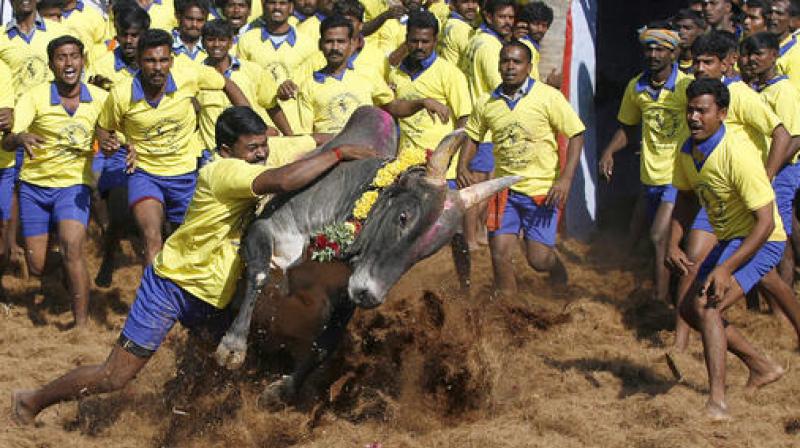All you need to know about Jallikattu and the controversy around it

Chennai: The Supreme Court ban on Jallikattu, a popular bull-taming sport in Tamil Nadu, has stirred up major outrage in the state over the past few days. Large numbers of people have taken to the streets, demanding that the ban on Jallikattu be lifted. Political parties across the spectrum have supported the protests in favour of the sport.
What is Jallikattu?
Jallikattu is a popular bull-taming sport celebrated mainly in Tamil Nadu every year, during the Pongal festival, on Mattu Pongal day. The sport involves releasing a running bull into a crowd of people. Participants attempt to grab the bull's hump and ride it for as long as possible, in an attempt to stop it. Sometimes, participants must also try and remove red flags attached to the bull’s horns. Calves are specially reared to become bulls fit for Jallikattu by feeding them a special diet.
The first known instances of Jallikattu in Indian history occur between the 1st and 4th century BC, during what is known as the Tamil classical period. It was the Aayars of Tamil Nadu living in the ‘Mullai’ geographical division of the area who are known to practice the tradition.
The controversy over Jallikattu
In recent times, Jallikattu has attracted protests from animal rights organizations in India. People for the Ethical Treatment of Animals (PETA) and Federation of India Animal Protection Agencies (FIAPA) have been at the forefront of opposing Jallikattu since as long back as 2004.
The Animal Welfare Board of India (AWBI) first filed a case in the Supreme Court of India for an outright ban on Jallikattu because of the cruelty to animals and the threat to public safety involved. The AWBI argued that the sport exploits the bulls' natural nervousness as prey animals by deliberately placing them in a terrifying situation and forcing them to run away. It also pointed out that sometimes, spectators get injured or even die. There have also been cases of bulls getting injured.
On November 27, 2010, the Supreme Court permitted the Tamil Nadu government to allow Jallikattu for five months in a year, and directed the District Collectors to make sure that the animals that participate in Jallikattu are registered to the Animal Welfare Board. An AWBI representative was also allowed to be present at Jallikattu events.
However, in 2011, the Ministry of Environment and Forests under the UPA government banned the use of bulls for sport, thereby effectively banning the festival. However, the Tamil Nadu Regulation of Jallikattu Act 2009 enabled Jallikattu to carry on unabated in the state.
Between 2010 and 2014, at least 17 people were killed and 1000-odd injured during Jallikattu events.
Finally, in May 2014, the apex court struck down the 2009 Act, and banned the practice. It further said that any flouting of the ban would result in penalties under the Prevention of Cruelty to Animals Act, 1960. The Supreme Court also ruled that cruelty is inherent in these events, as bulls are not anatomically suited for such activities and undergo ‘unnecessary pain and suffering’ as a result of the festival.
The tug of war between the apex court and the Central government continued however, with the government on January 8, 2016 allowing the practice of Jallikattu under certain conditions, through a notification. The Supreme Court then reimposed the ban on the event in July of the same year.
Protests in favour of Jallikattu began once again in early January 2017, before Pongal. The Supreme Court on January 12 rejected a plea by lawyers seeking urgent ruling on a batch of petitions filed before it against the ban on Jallikattu. This prevented Jallikattu from taking place during Pongal and infuriated large sections of the Tamil Nadu populace.
Defying the Supreme Court ban, the event was held in some places in the state, especially in Madurai, where the police arrested hundreds of people. The protest which began in the rural areas, soon found support from the students, IT professionals, the salaried and even sports persons and actors in urban areas.
Since Tuesday, Marina Beach in Chennai has turned into the hotbed of pro-Jallikattu protests, with thousands of people camping at the seafront demanding a lifting of the ban. Protests have also taken place in Coimbatore, Madurai and Delhi.
The top court, however, once against refused to rule on the issue on Thursday and asked the petitioner to approach the Madras High Court.

